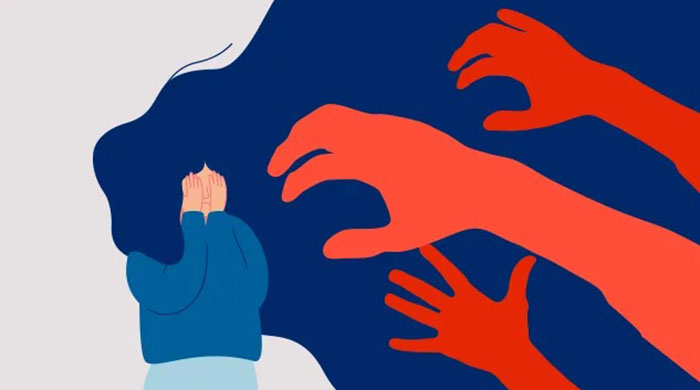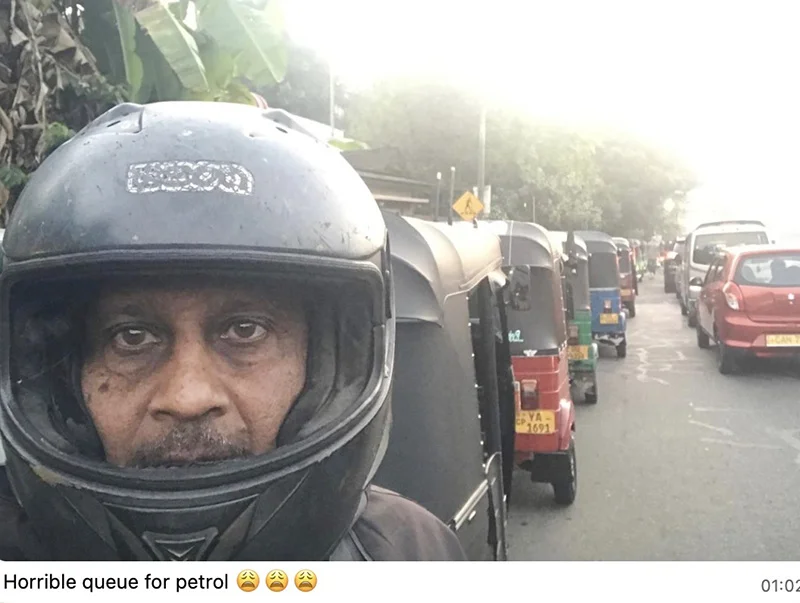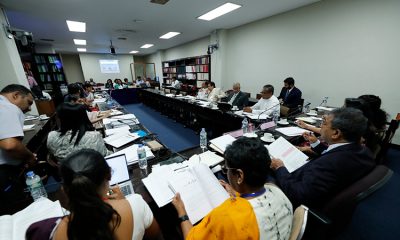Opinion
Proposed Penal Code amendment and threat of promotion of sexual abuse of children – VII

by Kalyananda Tiranagama
Executive Director
Lawyers for Human Rights and Development
(Part VI of this article appeared in The Island of 19 June 2023)
The Bill proposes to repeal these two Sections. If these two sections in the Penal Code are repealed, then anal sex and homosexual conduct (of male or female) in public or private will no longer be an offence. According to the submissions of the Additional Solicitor General, the repeal of the two provisions will not result in any lacuna in the law, placing the children in a vulnerable situation without any protection against sexual abuse, as the remaining provisions – S. 365B and S. 345 – of the Penal Code will provide adequate protection to the children against sexual abuse.
Let us examine S. 365B and S. 345 – of the Penal Code and see whether they can provide adequate protection to the children against sexual abuse, as submitted by the learned ASG.
S. 365B – Grave sexual abuse:
S. 365B (1) Grave sexual abuse is committed by any person who, for sexual gratification, does any act, by the use of his genitals or any other part of the human body or any instrument on any orifice or part of the body of any other person, being an act which does not amount to rape under S. 363, in circumstances falling under any of the following descriptions, that is to say: – (a) without the consent of the other person;
(aa) with or without the consent of the other person when the other person is under sixteen years of age;
(b) with the consent of the other person while such other person was in lawful or unlawful detention or where that consent has been obtained by use of force, or intimidation or threat of detention or by putting such other person in fear of death or hurt;
(c) with the consent of the other person where such consent has been obtained at a time the other person was of unsound mind or was in a state of intoxication induced by alcohol or drugs.
(2) Whoever –
(a) commits grave sexual abuse shall be punished with rigorous imprisonment for a term not less than seven years and not exceeding twenty years and with fine and shall also be ordered to pay compensation of an amount determined by court to the person in respect of whom the offence was committed for injuries caused to such person;
(b) commits grave sexual abuse on any person under 18 years of age (on a person between 16 to 18 years – only if committed without consent) shall be punished with rigorous imprisonment for a term not less than ten years and not exceeding twenty years and with fine and shall also be ordered to pay compensation of an amount determined by court to the person in respect of whom the offence was committed for injuries caused to such person.
Grave sexual abuse dealt with by S. 365B is an act committed by any person, for sexual gratification, using his genitals or any other part of the human body or any instrument on any orifice or part of the body of any other person, being an act which does not amount to rape under S. 363 of the Penal Code.
· Unlike in the case of carnal intercourse against the order of nature and gross indecency, in grave sexual abuse the act itself is not an offence. It becomes an offence only where it is committed (a) with or without consent on a person under 16 years of age; or (b) without consent of the person; or (c) with the consent of the person obtained while such other person was (i) in lawful or unlawful detention or (ii) by use of force, or intimidation or threat of detention or by putting such other person in fear of death or hurt; (iii) with the consent obtained at a time the other person was of unsound mind or was in a state of intoxication induced by alcohol or drugs.
· It is true that, as submitted by the ASG, with regard to any sexual conduct constituting grave sexual abuse, the consent of the child is immaterial where the offence is committed in respect of a child below the age of 16.
· But what about the children in the age group of 16 – 18 years? Are they not children? Are they not entitled to protection by the law against sexual abuse?
· Any person can commit any of the sexual acts mentioned in S. 365B with the consent of any child over 16 years of age.
· S. 365B will not provide any protection to such children and they will be left without any protection and open to abuse.
· Will they get any protection from S. 345 as submitted by the learned ASG. Let us see.
S. 345 – Sexual harassment
S. 345 – Whoever by assault or use of criminal force, sexually harasses another person or by the use of words or actions, causes sexual annoyance or harassment to such other person commits the offence of sexual harassment and shall on conviction be punished with imprisonment of either description for a term which may extend to five years or with fine or both, and may also be ordered to pay compensation of an amount determined by court to the person in respect of whom the offence was committed for injuries caused to such person.
Explanation: 1. Unwelcome sexual advances by words or action used by a person in authority in a working place or any other place shall constitute the offence sexual harassment.
2. For the purpose of this section an assault may include any act that does not amount to rape under S. 363.
· From the words used in the Section like assault or use of criminal force, sexual annoyance or harassment, unwelcome sexual advances for describing the offence, it is crystal clear that S. 345 is not intended to deal with cases of consensual sexual conduct.
· From the explanation given it clearly appears that it is intended to deal with a different type of offence;
· Even where an offender is convicted the Court has the discretion to release the offender with only a fine imposed, without any jail sentence imposed.
· From the lenient penalty laid down in the Section it clearly appears that it cannot protect children from being subject to grave crimes like anal sex.
· Children will not get any protection from S. 345 against gross acts of sexual abuse as submitted by the learned ASG.
** While making submissions before the Court, the learned ASG had stated: ‘‘Even if S. 365A is deleted in its entirety, behaving indecently in public can still be addressed under S. 7(1)(b) of the Vagrants Ordinance as well as S. 261 of the Penal Code, without criminalising a person’s sexuality.’’
*** On an analysis of S. 7(1)(b) of the Vagrants Ordinance and S. 261 of the Penal Code, it appears that the submission of the learned ASG is far from the truth.
Vagrants Ord. S. 7(1)(b):
‘any person found committing any act of gross indecency or found behaving with gross indecency, in or about any public place – shall be guilty of an offence and shall be liable on summary conviction to imprisonment of either description for a period not exceeding six months, or to a fine not exceeding one hundred rupees, or to both.
S. 261 of the Penal Code:
A person is guilty of a public nuisance who does any act or is guilty of an illegal omission, which causes any common injury, danger or annoyance to the public or to the people in general who dwell or occupy property in the vicinity or which must necessarily cause injury, obstruction, danger or annoyance to persons who may have occasion to use any public right.
· After S. 365A is repealed, gross indecency will no longer be an offence. There is no definition of gross indecency in any penal law. At present the Police can act under S. 7(1)(b) of the Vagrants Ordinance, arrest and prosecute a person committing any act of gross indecency in any public place because gross indecency is an offence punishable under S. 365A of the Penal Code. After S. 365A is repealed, when gross indecency is no longer an offence, how can the Police arrest and prosecute a person under S. 7(1)(b) of the Vagrants Ordinance?
· The Police may end up as respondents in Fundamental Rights Applications for committing an illegal arrest.
· Vagrants Ordinance is not a law enacted to deal with this type of issues; Vagrants Ordinance was enacted in 1841, to deal with problems created by labourers brought from South India to work temporarily in upcountry plantations, who had run away and taken shelter in various places to escape from being sent back to India after their period of work was over. This Ordinance has been amended 11 times before the Independence in 1948.
· It is an Ordinance enacted to deal with following categories of persons: (a) persons behaving riotously or disorderly in public streets; (b) persons who are deemed idle and disorderly persons; (c) persons who are deemed to be rogues and vagabonds; and (d) persons who are deemed to be incorrigible rogues.
· Having no income whatsoever, women belonging to these categories were soliciting men and engaging in prostitution to earn their living. S. 7 of the Vagrants Ordinance is intended to deal with them:
S. 7(1)(a) – any person in or about any public place soliciting any person for the purpose of the commission of any act of illicit sexual intercourse or indecency, whether with the person soliciting or with any other person, whether specified or not;
(b) any person found committing any act of gross indecency or found behaving with gross indecency, in or about any public place.
·Often these acts were committed in public toilets or other places close to bus stands or railway stations or road sides; this term ‘gross indecency’ is used here to cover all types of sexual acts – vaginal sex, anal sex, oral sex, or any other sexual act.
· Generally, it is under S. 7(1) of the Vagrants Ordinance the Police act for arresting street prostitutes and other women loitering at the bus stands and railway stations at night soliciting men for sexual activities and producing them in Courts.
** S. 261 of the Penal Code appears to be equally inapplicable to cover this situation. Only an act which causes any common injury, danger or annoyance to the public or to the people in general dwelling in the vicinity or an act which must necessarily cause injury, obstruction, danger or annoyance to persons who may have occasion to use any public right amounts to a public nuisance under this Section.
· Display of a person’s sexual orientation will not necessarily cause injury, obstruction, danger or annoyance to the public.
· If any person engages in sexual intercourse, anal sex, oral sex or any other sexual act or displaying their sexual organs openly in a public place that may necessarily lead to public annoyance.
· No person in his or her senses will engage in sexual intercourse, anal sex, oral sex or any other sexual act or display their sexual organs openly in a public place.
(To be concluded)
Opinion
Open letter to PUCSL on proposed electricity tariff revision

Although the Public Utilities Commission of Sri Lanka (PUCSL) has appropriately invited public consultation on the proposed electricity tariff revision from 27 February to 18 March, the online submission portal appears to contain a non-functioning submission tab. If this technical issue persists, it risks undermining the integrity and effectiveness of the entire consultation process. Consequently, I have chosen to present this letter openly for public consideration, including by the PUCSL.
Current geopolitical tensions in the Middle East underscore the urgent need for Sri Lanka to minimise its dependence on imported fossil fuels and prioritise the development of domestic renewable energy resources, including solar, hydro, and wind power. Such a transition is essential to securing a stable and independent energy supply. Regrettably, the Ceylon Electricity Board (CEB) appears to be moving in the opposite direction.
Promoting solar-powered electric vehicles supported by home-based renewable charging systems would strengthen national energy security and reduce pressure on imported fuel supplies. The fuel queues witnessed during periods of crisis, most notably in 2022, serve as a stark reminder of the risks associated with excessive dependence on external energy sources and the national anarchy that can follow.
As a small nation operating within a volatile global economy, Sri Lanka must remain as non-aligned and self-reliant as possible. Strengthening self-sufficiency in strategic sectors is critical to avoiding collateral damage amid escalating geopolitical rivalries among major powers. India has made steady progress along this path; Sri Lanka would be well-advised to do the same.
Raising electricity tariffs — a measure repeatedly adopted over the past decades to offset the high cost of fossil-fuel-based power generation — places an unfair burden on debt-ridden households and struggling businesses. Resorting once again to tariff increases, rather than addressing structural inefficiencies and fuel dependency, reflects a failure of long-term planning. The nation must instead pursue sustainable energy solutions that reduce costs over time.
As a debt-burdened country, Sri Lanka urgently requires pragmatic, forward-looking strategies that ease the pressure on citizens while strengthening resilience in times of geopolitical instability. Energy pricing is not a peripheral issue; it is a central pillar of economic stability and national security, demanding serious and immediate attention.
Established on 1 November 1969, the CEB was entrusted with the responsibility of generating and distributing electricity across the island while promoting social and economic development through the optimal use of national resources.
Recent developments suggest that the Ceylon Electricity Board has fallen short of these foundational objectives. Over the past two decades, electricity tariffs have been increased repeatedly under various justifications yet supply reliability has not consistently improved. The current proposed revision appears to perpetuate the same pattern: continued dependence on imported fossil fuels, directly contradicting the principle of optimally utilising national resources. This trajectory risks returning the country to recurring crises, including the prolonged fuel shortages and power cuts experienced in recent years.
Energy is not an ordinary commodity confined to a single sector; it affects every dimension of national life. High energy costs increase the cost of living by inflating expenses related to food production, transportation, manufacturing, and consumer goods. Ultimately, these costs are borne by citizens.
Moreover, elevated energy prices undermine national competitiveness by discouraging foreign investment and constraining local entrepreneurship, technological advancement, industrial expansion, and job creation. High-cost energy impedes national development.
Low-cost energy should therefore be formally adopted as a national policy objective. The CEB must adhere to its original mandate of optimising national resources for cost-effective electricity generation. Any deviation from this principle must be fully transparent and supported by clear, evidence-based justification.
Even in the sphere of renewable energy, concerns arise about the apparent preference for large-scale solar and battery storage projects that require substantial public funding. Previous claims of “grid instability” attributed to household rooftop solar generation were used to justify policy shifts. If electricity generated by rooftop solar during daylight hours was considered problematic, how would significantly larger solar installations differ in principle? Without systematic and transparent grid modernisation, such projects risk becoming costly stopgap measures rather than sustainable long-term solutions.
Poorly planned initiatives could once again expose the country to high delivery costs, reflected in elevated tariffs. They may also increase the risk of power disruptions due to battery limitations, spare-part shortages, infrastructure weaknesses, or maintenance failures. Sri Lanka has previously endured six- to ten-hour power outages, with severe economic and social consequences. The nation cannot afford a return to such instability.
It must also be recognised that rooftop solar installations, financed by homeowners — often through personal loans — have provided a crucial safety net for many families. By purchasing surplus energy from these “prosumers,” the system has functioned in a mutually beneficial manner for both households and the nation. Rather than discouraging decentralised generation, Sri Lanka should modernise its grid and meaningfully integrate citizen-led energy production. Short- and medium-term grid improvements could be facilitated through structured private-sector participation, including by prosumers themselves.
Globally, affordable energy underpins economic growth. Countries such as China, the United States, Norway, Brazil, and Canada have leveraged domestic energy resources to produce cost-effective power and accelerate development.
Sri Lanka must adopt a clear national policy centred on low-cost energy, fully utilising its natural endowments — solar, hydro, wind, and emerging technologies. Proposals prioritising imported fuels should be considered secondary and strictly transitional.
A nation that endures long queues for essential energy supplies cannot reasonably expect its citizens and businesses to remain productive and resilient. These realities are fundamentally incompatible.
Encouraging decentralised energy production would:
* Reduce the cost of living
* Improve national resilience
* Attract foreign investment
* Create employment
* Enhance export competitiveness
The people have entrusted the government with this responsibility. The time has come for a decisive, transparent, and forward-looking policy shift.
Chula Goonasekera
(cgoonase@sltnet.lk)
A concerned citizen
Opinion
Need for well-designed contracts and their implementation

The purchase of substandard coal using a faulty tendering process has become news lately. This enormous financial loss to the country indicates the urgent need for the Government to pass stronger contract laws and have their proper implementation in Sri Lanka by professionals. It is recommended that “Model” contracts need to be drawn up as typical examples and these made available to governmental departments who may need to enter into similar contracts. Do not ask a busy manager to design a contract, a legal document from scratch! Perhaps a whole department should be set up to monitor (police?) government and local government administration of contracts under English Contract Law and contracts under the United Nations Convention for International Sale of Goods (CISG). Perhaps now, it seems that anyone in government can draw up a contract and design it to suit his own whims and fancies!
I suggest here models of typical contracts, useable for different cases are made available for anyone or any department required to enter into a contract to enable them, or at least assist them to first formulate, and draw up an effective contract which must have certain important clauses. Contract administrators and supervisors need to be well trained, motivated and independent in order to administer Government contracts as the law of Sri Lanka should demand.
Contract Management
In the West, mutually agreed contracts are considered legal agreements enforceable by law under a given jurisdiction. There is the initiator of the contract named the Owner and a Main Contractor who agrees to implement the work for a price consideration, and who may delegate part, or all of the work to sub-contractors.
Contracts must provide all the information required by a contractor to complete the work. Contract clauses must incorporate all foreseeable eventualities. For example, the acceptance, as agreed and signed between the contacting parties by the supplier or lead contractor, needs to have clauses that allow for design changes (change orders), additional time and the formulation of related costs and profit accordingly. Such ‘in progress’ changes have procedures which are given in clauses dealing with ‘change orders’ which require assessing the cost of the change order implementation. Change order management may best be done by a firm of Quantity Surveyors.
The main contractor agrees with the owner to supply labour, materials and specialist equipment to fulfil the terms of the agreement or contract for a price. Special tax concessions, customs clearances and other legal requirements can fall on the shoulders of the Owner, or as negotiated from the outset. All these matters need to be clarified from the outset of any contract.
Time is of the essence. The time value of money is always at the forefront of the contract manager’s mind. The work is usually expected to be carried out to a time frame set by the owner. Therefore, the implementation of an agreement should be set in an agreed time frame with easily defined milestones marking progress and marking when appropriate payments become due.
Of course, contract administrators must make payments only when the work is verified as satisfactorily completed at each of previously agreed stages of the contract. Usually, there are time limitations, with penalties for time overruns. Owners want their goods delivered on time and to meet all contractual specifications on quality and performance. There should be clauses stipulating quality and quantity guarantees and guarantees of remedial repairs, continuing service agreements to be settled before an official handover and signing on completion of a contract. Final payment should be withheld until the guarantee period has expired. Preparing for these events needs computers, foresight and experience.
Small contracts are usually managed by the owner, but large, multimillion dollar contracts may be administered by an independent organisation. A contract is enforceable by law, with stated financial penalties for failures to abide by the terms of the contract, but all is subject to “Force Majeure.” This is when progress of the work is seriously impeded or impossible due to events totally outside the control of the Subcontractor.
Contract implementation is a large area, well catered for by laws in the English language. This letter can only raise questions about the quality of contract administration in Sri Lanka. Unfortunately, so few legislators have sufficient knowledge of English, resulting in loopholes allowing manipulation which may result in Sri Lankan public having to pay through the nose, pay dearly for incompetent practice.
I can suggest these improvements, but my actual experience is that all my letters, in English, to officialdom go unanswered and ignored.
Roger. O. Smith
Opinion
Sri Lanka Cricket needs a bitter pill

A systemic diagnosis of a fading legacy
The outcome of the 2026 T20 World Cup, coupled with the trajectory of the sport in recent years, provides harrowing evidence that Sri Lankan cricket is suffering from a terminal malignancy.The Doomsday clock for Sri Lankan cricket has not just started ticking—it has reached its final hour.
Therefore this note is written to call the attention of the cricketing elite who love the sport.
The current state of affairs suggests a pathology so deep-seated that conventional remedies—be it revolving-door coaching changes or fleeting, opportunistic victories—can no longer arrest its spread.
What we are witnessing is not a mere slump in form or a temporary lapse in rhythm; it is a profound systemic collapse that threatens the very foundation of our national pastime.
The Illusion of Recovery: The “Sanath Factor” as Palliative Care:
Since late 2024, the appointment of Sanath Jayasuriya as Head Coach injected a much-needed surge of adrenaline into the national side.
Statistically, the highlights were historic: a first ODI series win against India in 27 years, a Test victory at The Oval after a decade, and a clinical 2-0 whitewash of New Zealand.
However, a data-driven autopsy reveals that these will be “palliative” successes rather than a cure.
Under Jayasuriya’s tenure, the team maintained a win rate of approximately 50 percent (29 wins in 60 matches).
While analysts optimistically labeled this a “transitional phase,” the recent T20 series against England and Pakistan exposed the raw truth: in high-pressure “crunch” moments, the team’s performance metrics—specifically Strike Rate (SR) and Fielding Efficiency—regress to amateur levels.
We are not transitioning; we are stagnating in a professional abyss.
The Scientific Gap:
Why India and Australia Lead
The disparity between Sri Lanka and global giants such as the BCCI and Cricket Australia (CA) is now rooted in High-Performance Science and Algorithmic Management.
Predictive Analytics & Biometrics
In Australia, fast bowlers utilise wearable sensors to monitor workload and biomechanical stress.
AI models analyse this data to predict stress fractures before they occur.
Sri Lanka, conversely, continues to cycle through injured pacemen with no predictive oversight.
Virtual Reality (VR) Training
While Australian batters use VR to simulate the trajectories of elite global bowlers, Sri Lankan players remain tethered to traditional net sessions on deteriorating domestic tracks.
Data-Driven Talent Identification:
India’s “transmission system” utilises automated data analysis across thousands of domestic matches to identify players who thrive under specific pressure indices.
In Sri Lanka, 85 percent of national talent still originates from just four districts—a statistical failure in talent scouting and geographic expansion.
Infrastructure vs. Intellect:
A Misallocation of Capital
Sri Lanka Cricket (SLC) boasts massive reserves, yet its investment strategy is fundamentally flawed.
Capital is funneled into “bricks and mortar”—grand stadiums and administrative buildings—rather than the human capital of the sport.
We build colosseums but fail to train the gladiators.
The domestic structure remains a “spin trap.”
By producing “rank turners” to suit club politics, we have effectively de-skilled our batters against elite pace and rendered our spinners ineffective on the flat, true wickets required for international success.
The Leadership Deficit:
A Failure of Succession Planning
The crisis of leadership post-Sangakkara and Mahela is a byproduct of poor “Succession Science.”
Australia maintains a “Culture of Continuity,” backing leadership even through lean periods to ensure stability.
India employs a rigid “Succession Roadmap,” ensuring the next generation is integrated into the system long before the veterans depart.
In contrast, SLC operates on a “carousel of convenience,” changing captains and coaches to distract from administrative failures.
This lack of imaginative management stems from a low literacy in modern Sports Governance.
From a philosophical perspective, our established cricketing traditions have failed to absorb the antithesis of the modern, hyper-professionalized global game.
As a result, a truly modern Sri Lankan brand of cricket has failed to materialise.
Instead, we are trapped in what is called a “Static Synthesis,” where the administration clings to the glories of 1996 and 2014 as a shield against the necessity of change.
This is not a transition; it is a refusal to evolve
We are witnessing the alienation of the sport from its people, where the “Master” (the administration) has become detached from the “Slave” (the grassroots talent and the fans).
The Verdict:
A National Emergency
The “cancer” in Sri Lankan cricket is a trifecta of political interference, irrational management, and a refusal to embrace the Fourth Industrial Revolution (AI, VR, and Big Data).
As someone who contributed to the formation of the Sri Lankan Professional Cricketers’ Association, I see the current trajectory as a betrayal of the players’ potential and the nation’s heritage.
Sri Lanka Cricket does not need another “review committee” or a new coach to act as a human shield for the board.
It needs a “Bitter Pill”—an aggressive, independent restructuring that prioritises scientific professionalisation over cronyism.
Without this, our cricket will remain at the bottom of the well, looking up at a world that has moved light-years ahead.
Shiral Lakthilaka
LLB, LLM/MA
Attorney-at-Law
Former Advisor to H.E. the President of Sri Lanka
Former Member of the Western Provincial Council
Executive Committee member of the Asian Social Democratic Political Parities
-

 Opinion5 days ago
Opinion5 days agoJamming and re-setting the world: What is the role of Donald Trump?
-

 Features5 days ago
Features5 days agoAn innocent bystander or a passive onlooker?
-

 Features2 days ago
Features2 days agoBrilliant Navy officer no more
-

 Features6 days ago
Features6 days agoRatmalana Airport: The Truth, The Whole Truth, And Nothing But The Truth
-

 Opinion2 days ago
Opinion2 days agoSri Lanka – world’s worst facilities for cricket fans
-

 Business6 days ago
Business6 days agoIRCSL transforms Sri Lanka’s insurance industry with first-ever Centralized Insurance Data Repository
-

 Business5 days ago
Business5 days agoAn efficacious strategy to boost exports of Sri Lanka in medium term
-

 Features3 days ago
Features3 days agoOverseas visits to drum up foreign assistance for Sri Lanka



















